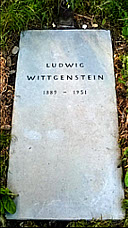
About this site
A philosophy site by Mark in Malaysia.My real interest is the mind-body problem and I’m gradually trying to figure out what I want to say about this.
Meanwhile, here’s some other stuff that I’ve found to be more tractable over the years, hard as they are in themselves.
 Wittgenstein’s grave in Cambridge receives more than a hundred visitors every year, not that there’s a contest.
Wittgenstein’s grave in Cambridge receives more than a hundred visitors every year, not that there’s a contest.I discovered philosophy when I was twenty-one and never looked back. Duck finally found water and I cannot even begin to describe what the subject did for me.
I also had many reliable teachers at all levels to whom I am very grateful. I hope that some people will find this site useful in return.
What is time?
 My soul is on fire to know this most intricate enigma.
My soul is on fire to know this most intricate enigma.
The concept of time is a pretty puzzling one. To some eyes, it sits right up there along with the concept of consciousness as something we can never hope to understand. Personally, however, I don’t really buy that, since we are speaking here of a concept that everyone possesses and operates with at some level or other. So it seems to me that we ought to be able to articulate what the concept of time boils down to – for us, at least.
We certainly do operate with some such concept as that of “time.” As we go about our lives, we think of ourselves as inhabiting not just a spatial world but also a temporal one. Otherwise put, we take ourselves to be creatures not just of space but also of time. Both the concepts of space and time are thus utterly familiar to us but we tend (somehow) to find time to be the more puzzling of the two. (So far as I know, nobody’s soul was ever on fire to know the most intricate enigma of space.) Here’s how Michael Lockwood puts it:
A question like this is pretty hard. Some people think that we are dealing here with notions so basic to our conceptual scheme that there is no real prospect of elucidating them. Ned Markosian, for example, says that:
Another example concerns the “passage of time.” Philosophers often ask whether time really passes or whether this is just a false projection of our minds onto reality. For example, the theory of relativity is sometimes taken to show that there is no such thing (really) as the “passage of time”—i.e., that nothing is really “passing” in the way one might unthinkingly assume. Or consider Markosian’s paper referred to above, which proposes to tackle not just the question of whether time passes but also the issue of how fast it passes.
But what, in the first place, does our notion of the “passage of time” really amount to? We doubtless operate with some such notion in our daily lives and I would definitely want to pause at this point to try to spell this ordinary notion out a little. In other words, never mind (for now) whether time is really passing, or how fast it passes, or anything of that sort. What do we even suppose to be happening when we take time to be “passing”?
But—here again—a philosopher might suggest that the notion of “time passing” is conceptually too basic to bear any real elucidation. He or she might suggest that the notion is given directly to us in experience when we attend to the experience of “waiting” for something, or when we notice that the contents of our conscious experiences are continuously changing. As Barry Dainton puts it:
 It can be tempting to say that we know what “change” is by observing the changing contents of our conscious experience. Even animals and infants are given such change, right there in their conscious experiences. Surely you pick up the concept of change by attending to your changing conscious experience? It is doubtless a primitive concept, known directly by acquaintance.
It can be tempting to say that we know what “change” is by observing the changing contents of our conscious experience. Even animals and infants are given such change, right there in their conscious experiences. Surely you pick up the concept of change by attending to your changing conscious experience? It is doubtless a primitive concept, known directly by acquaintance.
I don’t think it can be that simple though. For one thing, this sort of explanation seems too easy. For another, we’d still need to explain the exact relation between the concepts of time and change. But, worst of all, it seems to me that, short of possessing the concept of change, one would not “observe” any change whatsoever, even if it was taking place before one’s eyes. It strikes me, in other words, that one must learn how to see change, just as one must learn how to see colour, or distance, or motion—or (indeed) how to see the world as existing in time. So while there may be some meaning to linking the concepts of time and change, there is yet no relief, since the concept of change is not all that much easier to explain than the concept of time.
Sooner or later, some harder digging has got to be done. Personally, I’d be happy enough to understand the concept of change, regardless of whether that then helps us understand the concept of time. (It seems like it should though.) For example, if we can get clearer on how children (say) acquire the concept of change, i.e., on what children learn when they learn how to conceive of their surroundings as “changing,” then I think we’d be halfway towards answering these burning questions.
[2015]

– St. Augustine, Confessions
The concept of time is a pretty puzzling one. To some eyes, it sits right up there along with the concept of consciousness as something we can never hope to understand. Personally, however, I don’t really buy that, since we are speaking here of a concept that everyone possesses and operates with at some level or other. So it seems to me that we ought to be able to articulate what the concept of time boils down to – for us, at least.
We certainly do operate with some such concept as that of “time.” As we go about our lives, we think of ourselves as inhabiting not just a spatial world but also a temporal one. Otherwise put, we take ourselves to be creatures not just of space but also of time. Both the concepts of space and time are thus utterly familiar to us but we tend (somehow) to find time to be the more puzzling of the two. (So far as I know, nobody’s soul was ever on fire to know the most intricate enigma of space.) Here’s how Michael Lockwood puts it:
It does seem right that the concept of time is rather elusive and (thus) easily lent to metaphor. But suppose we were determined to forego all metaphor. Suppose our souls were on fire and we were determined to capture the elusive. How then would we explain the concept of time? For example, what do we take ourselves to be talking about when we speak of the past? What do we understand when we understand that a certain event has already happened – e.g., yesterday? What does it mean, “already”? It is our word, our language. So what do we mean by it?Our sense of ourselves as enduring through time pervades our entire conception of the human predicament. But in attempting to articulate this crucial temporal aspect of our being, we find ourselves resorting to metaphor in a way that seems unnecessary when it comes to space …… we speak of the ‘march’ or ‘flow’ of time, while in our finest literature we find such images as Marvell’s ‘time’s winged chariot’ or Shakespeare’s ‘womb of time.’ Space, by constrast, does not need such metaphors … Time strikes us as elusive, in a way that space does not. (The Labyrinth of Time.)
A question like this is pretty hard. Some people think that we are dealing here with notions so basic to our conceptual scheme that there is no real prospect of elucidating them. Ned Markosian, for example, says that:
Indeed, the philosophical literature on time is awash with such further-down-the-road disputes as whether the past continues to exist (once it has become past) or whether only the present can strictly ever be said to exist. Or with whether the future “comes into being” as time rolls by or whether the future has (unsuspected by us) lain before us all along. Participants of these disputes often take the notions of ‘past,’ ‘present’ and ‘future’ for granted, as though it was obvious enough what these everyday terms are supposed to mean. —I find it far from obvious though and cannot help feeling that we will not get very far with the concept of time if we do not first tackle the more basic questions.… everyone already has a fairly intuitive sense of what it means to say that a certain time or event is past. So there is no particularly pressing need to come up with a scheme for analyzing away such talk. (‘How Fast Does Time Pass?’)
Another example concerns the “passage of time.” Philosophers often ask whether time really passes or whether this is just a false projection of our minds onto reality. For example, the theory of relativity is sometimes taken to show that there is no such thing (really) as the “passage of time”—i.e., that nothing is really “passing” in the way one might unthinkingly assume. Or consider Markosian’s paper referred to above, which proposes to tackle not just the question of whether time passes but also the issue of how fast it passes.
But what, in the first place, does our notion of the “passage of time” really amount to? We doubtless operate with some such notion in our daily lives and I would definitely want to pause at this point to try to spell this ordinary notion out a little. In other words, never mind (for now) whether time is really passing, or how fast it passes, or anything of that sort. What do we even suppose to be happening when we take time to be “passing”?
But—here again—a philosopher might suggest that the notion of “time passing” is conceptually too basic to bear any real elucidation. He or she might suggest that the notion is given directly to us in experience when we attend to the experience of “waiting” for something, or when we notice that the contents of our conscious experiences are continuously changing. As Barry Dainton puts it:
He adds:… [it] seems plausible to suppose that our impression that time itself passes or flows is heavily bound up with the dynamic, flowing, changing, character of our ordinary everyday experience.
… these more elemental aspects of consciousness do not (obviously) require or depend on conceptualized awareness—couldn’t the experience of animals or infants be stream-like? (‘Time, Passage and Immediate Experience.’)We certainly do we seem to be aware of the “stream-like” character of our experience of the world. Alternately, the world seems to be “continuously changing” before our eyes. And our notion of the passing of time does indeed appear to be closely entangled with this notion of continuous change in the world. But, of course, this just shifts the bump in the conceptual rug, for we can now ask, what (after all) is our concept of “change” in the world? What do we understand when we understand that the leaves on a tree have changed their colour, or that the hands of a clock have changed their position. What does it mean, “changed”? It is our word, our language. So what do we mean by it?

I don’t think it can be that simple though. For one thing, this sort of explanation seems too easy. For another, we’d still need to explain the exact relation between the concepts of time and change. But, worst of all, it seems to me that, short of possessing the concept of change, one would not “observe” any change whatsoever, even if it was taking place before one’s eyes. It strikes me, in other words, that one must learn how to see change, just as one must learn how to see colour, or distance, or motion—or (indeed) how to see the world as existing in time. So while there may be some meaning to linking the concepts of time and change, there is yet no relief, since the concept of change is not all that much easier to explain than the concept of time.
Sooner or later, some harder digging has got to be done. Personally, I’d be happy enough to understand the concept of change, regardless of whether that then helps us understand the concept of time. (It seems like it should though.) For example, if we can get clearer on how children (say) acquire the concept of change, i.e., on what children learn when they learn how to conceive of their surroundings as “changing,” then I think we’d be halfway towards answering these burning questions.
[2015]
Menu
 Can teleportation be verified empirically?
Can teleportation be verified empirically? What’s a logical paradox?
What’s a logical paradox? Achilles & the tortoise
Achilles & the tortoise The surprise exam
The surprise exam Newcomb’s problem
Newcomb’s problem Newcomb’s problem (sassy version)
Newcomb’s problem (sassy version) Seeing and being
Seeing and being Logic test!
Logic test! Philosophers say the strangest things
Philosophers say the strangest things Favourite puzzles
Favourite puzzles Books on consciousness
Books on consciousness Philosophy videos
Philosophy videos Phinteresting
Phinteresting Philosopher biographies
Philosopher biographies Philosopher birthdays
Philosopher birthdays Draft
Draftbarang 2009-2025  wayback machine
wayback machine
 wayback machine
wayback machine




